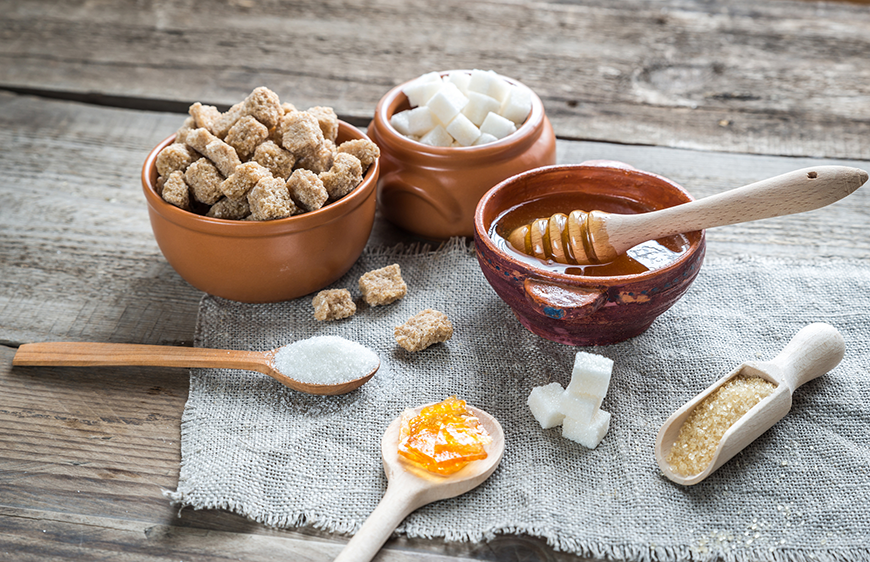I recently found myself with an insatiable craving for barbecue pulled pork — but I had a problem.
Barbecue pulled pork requires barbecue sauce. And most commercially available barbecue sauces are loaded with sugar, which I was actively trying to avoid as part of my Whole30 challenge. Fortunately, Pinterest came to my rescue with a Whole30-compliant barbecue sauce recipe that used unsweetened dates as a sugar substitute. The result (with some tweaking on my part) was a thick, tangy sauce with a hint of fruit and just enough spice. Craving quelled — and I didn’t even miss the sugar.
You may have found yourself in a similar situation. Whether you’re doing an elimination diet, watching your blood sugar, or just trying to shed a few pounds, you want to cut back on your refined sugar intake. But occasionally, you still want something sweet, and you aren’t willing to use artificial sweeteners, which have earned themselves a pretty bad reputation in recent years.
So what are your options? And will making a change really benefit your health?
What Are Natural Sweeteners, Anyway?
Sure, sugar comes from a natural source — sugarcane. But by the time white sugar makes it to our neighborhood grocery store, it’s been so processed and refined that it scarcely resembles its natural state. Instead, when we talk about a natural sweetener, we’re talking about a food that has gone through few-to-no changes (such as processing or chemical additives).
While the Cleveland Clinic suggests that the best way to sweeten up a dish is by adding fresh or frozen fruit, you can’t exactly replace the sugar in a birthday cake recipe with a handful of strawberries and expect the cake to come out fine. Instead, you’ll need a sugar substitute.
There are many kinds of natural sweeteners on the market today, and you may already have some of them in your kitchen. Raw honey, pure maple syrup, and blackstrap molasses can all sweeten your coffee, but they have a stronger flavor than refined sugar. So if you use them in a recipe, the end result might taste different from what you’re used to. Coconut sugar and date sugar are more taste-neutral options, but you’re less likely to have them on hand. And stevia is only considered “natural” in its leaf form. By the time it’s refined into products like Truvia®, it’s hard to tell what’s been added or taken away.
How Can I Use Sugar Substitutes?
Natural sweeteners tend to be sweeter than refined sugar, so you’ll find that a little goes a long way. Here are some tips on how to substitute sugar with a natural sweetener:
- Honey is more calorically dense than sugar, but a half cup of honey will get you just as far as a full cup of sugar (just be sure to drop your oven temperature and follow these other hints if you’re baking with honey). If you can’t get your honey from a local source, always check the nutrition label to make sure that honey is the only ingredient listed — some companies add high fructose corn syrup to their honey.
- Coconut sugar and date sugar. Coconut sugar and date sugar make a great substitute for brown sugar in recipes. If you’re using one of these alternatives, which have about as many calories per teaspoon as refined sugar, you can use as little as two-thirds of the required amount and save one-third of the calories.
- Pure maple syrup. Pure maple syrup, which has just two more calories per teaspoon than refined sugar, is sweet enough that three-quarters of a cup will do when your recipe calls for a full cup of sugar. You’ll save about 150 calories in the recipe and you’ll get 25 percent of your daily value of magnesium in each serving. As with honey, some companies will add high fructose corn syrup to maple syrup, so be sure to read the nutrition label and look for pure maple syrup.
When in doubt, consult the Internet. There are plenty of resources online that not only tell you how to substitute natural sweeteners for sugar but also let you know which natural sweeteners to use when.
Are Natural Sweeteners Better For Me?
Well, yes and no. Some natural sweeteners contain notable antioxidant levels and minerals (while in others, these levels are insignificant). The natural sweeteners that are minimally processed, like pure maple syrup and raw honey, are foods that humans have been eating for thousands of years. Our body is used to these, so we digest them more easily and may see less of an insulin spike after consuming these sweeteners versus refined sugar — good news if you want to avoid “sugar crashes.”
But sugar is still sugar, whether it’s processed out of sugarcane or boiled out of tree sap. And sugar should be eaten in moderation. Cynthia Sass, a registered dietitian and contributing editor to Health magazine, recommends limiting natural sweeteners as you would sugar: No more than six teaspoons daily for women or nine teaspoons daily for men. Just because natural sweeteners are different, it doesn’t mean you get to go all in. But because you can usually get more sweetness per teaspoon of a natural sweetener versus refined sugar, an even sweeter life may lie ahead!
Original post by Jill Ashley Blair Ivey, Independence Blue Cross


